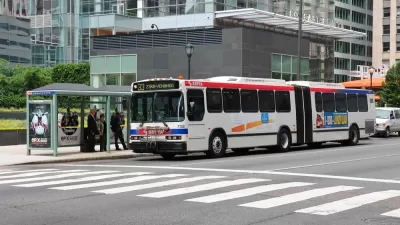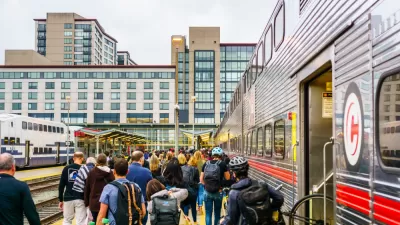The final infrastructure deal cutting by more than half the transit funding proposed in the American Jobs Plan.

As Congress finalized its infrastructure deal, writes Jeff Davis, the funding allocated to public transit shrank "from $85 billion (really $110 billion) in President Biden’s American Jobs Plan, down to $48.5 billion in the June bipartisan infrastructure 'framework,' to $39.2 billion in the final bipartisan infrastructure deal."
In the June 24 BIF, "President Biden and his team had signed off on a framework that reduced the total above-baseline funding for roads, bridges, and major projects by 31 percent ($49 billion) from the combined total in the original American Jobs Plan. But the White House had also endorsed a framework that reduced above-baseline funding for public transit from $110 billion (including the electric transit buses) to $48.5 billion, which was a 56 percent reduction from the original request."
Then, transit funding was slashed again by $4.4 billion. "This time the reduction came entirely from the general fund advance appropriations for the Federal Transit Administration, reducing that amount of money from $24.35 billion to $20.00 billion, and reducing the total above-baseline mass transit funding provided by the bill down to $39.2 billion."
"Transit advocates are looking to reopen the bipartisan bill by getting additional funding for mass transit as part of the budget reconciliation bill that will move through Congress in September and October." But if that happens, Davis writes, "members of the bipartisan Senate negotiating team might feel obligated to reopen the other parts of the bill that were negotiated in exchange for the lowered transit funding."
FULL STORY: How Transit Got Traded Away in the Bipartisan Infrastructure Deal

Planetizen Federal Action Tracker
A weekly monitor of how Trump’s orders and actions are impacting planners and planning in America.

Map: Where Senate Republicans Want to Sell Your Public Lands
For public land advocates, the Senate Republicans’ proposal to sell millions of acres of public land in the West is “the biggest fight of their careers.”

Restaurant Patios Were a Pandemic Win — Why Were They so Hard to Keep?
Social distancing requirements and changes in travel patterns prompted cities to pilot new uses for street and sidewalk space. Then it got complicated.

Platform Pilsner: Vancouver Transit Agency Releases... a Beer?
TransLink will receive a portion of every sale of the four-pack.

Toronto Weighs Cheaper Transit, Parking Hikes for Major Events
Special event rates would take effect during large festivals, sports games and concerts to ‘discourage driving, manage congestion and free up space for transit.”

Berlin to Consider Car-Free Zone Larger Than Manhattan
The area bound by the 22-mile Ringbahn would still allow 12 uses of a private automobile per year per person, and several other exemptions.
Urban Design for Planners 1: Software Tools
This six-course series explores essential urban design concepts using open source software and equips planners with the tools they need to participate fully in the urban design process.
Planning for Universal Design
Learn the tools for implementing Universal Design in planning regulations.
Heyer Gruel & Associates PA
JM Goldson LLC
Custer County Colorado
City of Camden Redevelopment Agency
City of Astoria
Transportation Research & Education Center (TREC) at Portland State University
Camden Redevelopment Agency
City of Claremont
Municipality of Princeton (NJ)





























